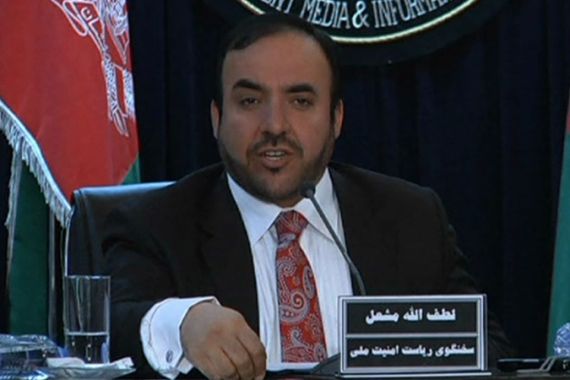Taliban arrested for Afghan school poisonings
Government says Taliban members among 15 people arrested over spate of girls’ school poisonings in Takhar province.

The Afghan government has arrested 15 people in connection with a spate of poisoning at girls’ schools in the northeast of the country.
Girls from six schools in northern Takhar province have suffered from mass fainting episodes in as many weeks.
The National Directorate of Security (NDS), the Afghan intelligence service, has accused the Taliban of bribing school officials and at least one young girl of introducing the poison into the schools’ drinking water.
NDS officials say the poisonings are part of an effort by the Taliban to scare families from sending their children to school, an accusation the group has refuted.
“We had directions from the president of Afghanistan to investigate. NDS was able to arrest 15 people, 12 of them Taliban” among those detained, said Lotfullah Mashal, NDS spokesman.
At a news conference on Wednesday, Mashal said among those arrested were the so-called Taliban shadow deputy governor of the salt-rich province, senior Taliban military commanders, a teacher, a school treasurer and his wife.
A school girl, paid 50,000 Afghanis, about $14,000 dollars, to poison her school’s drinking water was also among the arrested, the NDS said.
‘No security’
Noorjahan Akbar, co-founder of the Kabul-based organisation Young Women for Change, says the claims of infiltration by school officials highlights the need for security in the schools.
“In Afghanistan there is not just a single group that would carry out such attacks, more important than who actually conducted the attacks is the fact that there is no security in the schools,” Akbar said.
Parnian Nazary, programme officer for the Afghanistan Regional Project (ARP) at the Centre on International Co-operation (CIC) at New York University, says the continued attacks, despite the group’s disavowal of the practice, highlights “how fractured the Taliban are” and that there are many other groups associated with the Taliban who may not be following the dictates of its leadership.
Along with the Taliban, the intelligence service also accused the Jandullah and Mahazullah fronts of the “inhuman acts,” which he said were motivated by foreign spy agencies.
Though the Taliban have issued two statements in as many weeks denying responsibility for the poisonings, Mashal said the NDS has proven documentation of the group’s role.
“Because Taliban will have less credibility in the face of society, they don’t claim responsibility … Their aim is to promote fear among the people of Afghanistan; their main motivators are regional spy agencies,” Mashal told reporters.
The Taliban have said they will punish any parties responsible for the poisonings.
Speaking to Al Jazeera, Manizha Nader, of Women for Afghan Women, a grassroots organisation focusing on the human rights of women and girls in the country, said the “barbaric act” is further proof that there has been little change among the Taliban.
“They are still against girls education and women’s advancement. They are not to be trusted. And any negotiations should be stopped,” said Nader, referring to reports of ongoing talks between the government of Hamid Karzai and the Taliban.
Politics
Nazary said education had gone beyond an issue of security and rights and moved into the political arena.
“In many instances the Taliban have co-operated in opening schools”, said Nazary, in an act which she said was part of the concessions made by the group to win the support of people in communities in which they seek refuge.
Nazary points to a recent shutdown of schools in the eastern province of Ghazni by the group following a province-wide ban on unlicensed motorcycles, as an example of the Taliban’s use of education as a political tool.
Hadi Marefat, founder and director of the Afghanistan Human Rights and Democracy Organisation, said the closures in Ghazni also highlight the lack of government strategy in properly dealing with attacks on education.
“The government has not displayed a serious interest in the issue … When a school does open in Afghanistan, it is at the insistence of the people themselves,” said Marefat.
Orzala Ashraf Nemat, an Afghan human rights campaigner, said that in remote parts of the country, schools can be seen as a public service that represents the state in the villages.
Given this fact, Nemat says it is highly plausible that a school is attacked as part of an agenda to show the weakness of the state.
“To attack the school is as if a government property is attacked,” said Nemat, pointing out that such an act even in remote areas can manage to reach the capital.
‘Up to the families’
Though the northern province has been at the centre of the wave of outbreaks in school sicknesses, there have also been recent reported cases in eastern Ghazni and Khost provinces.
Marefat said the real danger in attacks like these is the impact such acts may have on families sending their daughters to school.
“The attacks do have an impact on every girl throughout the country, but ultimately it is up to the families to decide how to react.”
In very conservative families, said Marefat, the attacks “can become an excuse” through which to keep their daughters out of school.
To reduce the likelihood of such occurences, “there needs to be a system in place so the girls and their parents are not pressured to give up their education to these groups,” Akbar told Al Jazeera.
The mid-May incident in Khost province saw nearly 400 schoolboys suffer from a similar poisoning attempt.
Prior to Wendesday’s arrests, some Afghan officials had said the incidents could have been a case of mass hysteria, a claim which Nazary refutes.
“It would be difficult for me to agree with that statement because it has been happening in several schools in a targeted manner for several weeks now”.